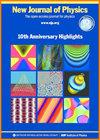望远镜成像超越极低信噪比的雷利极限
IF 2.8
2区 物理与天体物理
Q2 PHYSICS, MULTIDISCIPLINARY
引用次数: 0
摘要
瑞利极限和低信噪比(SNR)情况对遥感、红外热成像和空间领域感知中使用的光学成像系统造成了极大的限制。在本研究中,我们介绍了一种随机亚瑞利成像(SSRI)算法,用于在低信噪比条件下(甚至低于瑞利极限)定位点物体并估计其位置、亮度和数量。我们的算法采用最大似然法,利用入射光子的泊松分布克服了低信噪比条件下的瑞利极限。在我们的实验验证中,我们将重点放在亚瑞利极限(0.49-1.00 R)内的紧密间隔光源和微弱信号(信噪比小于 1.2)的条件下,这与实际情况非常接近。我们使用 Jaccard 指数和 Jaccard 效率来量化亚雷利区域的成像性能。在低信噪比、亚雷利区,我们的方法始终优于理查德森-卢西(Richardson-Lucy)和 CLEAN 等成熟算法 4 倍。我们的 SSRI 算法允许现有的基于望远镜的光学/红外成像系统克服亚雷利、低信噪比源分布的极端限制,可能会对包括被动热成像、遥感和空间域感知在内的广泛领域产生影响。本文章由计算机程序翻译,如有差异,请以英文原文为准。
Telescope imaging beyond the Rayleigh limit in extremely low SNR
The Rayleigh limit and low signal-to-noise ratio (SNR) scenarios pose significant limitations to optical imaging systems used in remote sensing, infrared thermal imaging, and space domain awareness. In this study, we introduce a stochastic sub-Rayleigh imaging (SSRI) algorithm to localize point objects and estimate their positions, brightnesses, and number in low SNR conditions, even below the Rayleigh limit. Our algorithm adopts a maximum likelihood approach and exploits the Poisson distribution of incoming photons to overcome the Rayleigh limit in low SNR conditions. In our experimental validation, which closely mirrors practical scenarios, we focus on conditions with closely spaced sources within the sub-Rayleigh limit (0.49–1.00 R) and weak signals (SNR less than 1.2). We use the Jaccard index and Jaccard efficiency as a figure of merit to quantify imaging performance in the sub-Rayleigh region. Our approach consistently outperforms established algorithms such as Richardson–Lucy and CLEAN by 4X in the low SNR, sub-Rayleigh regime. Our SSRI algorithm allows existing telescope-based optical/infrared imaging systems to overcome the extreme limit of sub-Rayleigh, low SNR source distributions, potentially impacting a wide range of fields, including passive thermal imaging, remote sensing, and space domain awareness.
求助全文
通过发布文献求助,成功后即可免费获取论文全文。
去求助
来源期刊

New Journal of Physics
物理-物理:综合
CiteScore
6.20
自引率
3.00%
发文量
504
审稿时长
3.1 months
期刊介绍:
New Journal of Physics publishes across the whole of physics, encompassing pure, applied, theoretical and experimental research, as well as interdisciplinary topics where physics forms the central theme. All content is permanently free to read and the journal is funded by an article publication charge.
 求助内容:
求助内容: 应助结果提醒方式:
应助结果提醒方式:


